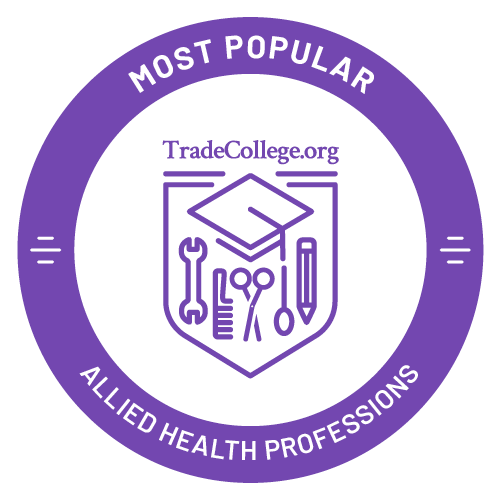Find Trade Colleges
2023 Most Popular Allied Health Professions Bachelor's Degree Trade Schools in Connecticut
Finding the Best Allied Health Professions Bachelor's Degree School for You
In 2021-2022, allied health professions students earned 701 degrees and certificates from a Connecticut school, making the subject the 3rd in the state.
When it comes to higher education, there are a lot of options for trade school students. As online education oppotunities continue to grow, you're not restricted to just schools in your local area anymore. Even some of the 'big name' schools are offering online courses.
To help you arm yourself with the information you need to make your decision, Trade College Search has developed this Most Popular Allied Health Professions Bachelor's Degree Trade Schools in Connecticut ranking. Our analysis looked at 8 schools in Connecticut to see which bachelor's degree programs were the most popular for trade school students. To create this ranking we looked at how many students graduated from the Allied Health Professions program at each school on the list.
Featured schools near , edit
2023 Most Popular Allied Health Professions Bachelor’s Degree Schools in Connecticut
The following schools top our list of the Most Popular Allied Health Professions Bachelor's Degree Colleges.
Most Popular Connecticut Trade Schools for a Bachelor's in Allied Health Professions
Our analysis found Sacred Heart University to be the most popular school for allied health professions students who want to pursue a bachelor’s degree in Connecticut. Sacred Heart is a fairly large private not-for-profit school located in the suburb of Fairfield.
Women make up 88% of the allied health majors at the school.
Assuming that a graduate chooses a 10-year repayment plan, the average monthly loan payment is $927.
The in-demand bachelor’s degree programs at Quinnipiac University helped the school earn the #2 place on this year’s ranking of the most popular allied health professions schools in Connecticut. Quinnipiac is a moderately-sized private not-for-profit school located in the suburb of Hamden.
About 75% of the students majoring in allied health at the school are women while 25% are male.
When it comes time to repay the loan, graduates who are on a 10-year repayment plan pay an average monthly payment of $1,125.
Out of the 8 schools in Connecticut that were part of this year’s ranking, University of Hartford landed the # 3 spot on the list. Located in the medium-sized city of West Hartford, UHart is a private not-for-profit school with a medium-sized student population.
Women make up 84% of the allied health majors at the school.
Read full report on Allied Health Professions at University of Hartford
A rank of #4 on this year’s list means University of Connecticut is a great place for allied health professions students working on their bachelor’s degree. Located in the large suburb of Storrs, UCONN is a public college with a fairly large student population.
Read full report on Allied Health Professions at University of Connecticut
The in-demand bachelor’s degree programs at University of New Haven helped the school earn the #5 place on this year’s ranking of the most popular allied health professions schools in Connecticut. Located in the suburb of West Haven, University of New Haven is a private not-for-profit school with a medium-sized student population.
Of the 23 students majoring in allied health at University of New Haven, 65% are male and 35% are female.
Read full report on Allied Health Professions at University of New Haven
Central Connecticut State University came in at #6 in this year’s edition of the Most Popular Allied Health Professions Bachelor’s Degree Trade Schools in Connecticut ranking. Located in the large suburb of New Britain, CCSU is a public college with a moderately-sized student population.
Full Allied Health Professions at Central Connecticut State University Report
With a ranking of #6, Southern Connecticut State University did quite well on this year’s most popular schools for allied health professions students working on their bachelor’s degree. SCSU is a moderately-sized public school located in the city of New Haven.
About 74% of the students majoring in allied health at the school are women while 26% are male.
After completing their Bachelor's Degree, allied health graduates from SCSU carry an average student debt load of $21,080.
Read full report on Allied Health Professions at Southern Connecticut State University
Goodwin College landed the #8 spot in the 2023 rankings for the most popular bachelor’s degree allied health professions programs. Located in the city of East Hartford, Goodwin is a private not-for-profit school with a small student population.
Best Allied Health Professions Colleges in the New England Region
Explore all the Most Popular Allied Health Professions Colleges in the New England Area or other specific states within that region.
| State | Degrees Awarded |
|---|---|
| Massachusetts | 773 |
| Maine | 281 |
| Rhode Island | 158 |
| New Hampshire | 112 |
| Vermont | 49 |
Allied Health Professions Related Majors
One of 11 majors within the trade school area of study, allied health professions has other similar majors worth exploring.
Allied Health Focus Areas
Most Popular Related Majors
| Related Major | Annual Graduates |
|---|---|
| Health & Medical Administrative Services | 88,600 |
| Practical Nursing & Nursing Assistants | 85,339 |
| Allied Health & Medical Assisting Services | 83,587 |
| Health Sciences & Services | 36,762 |
| Mental & Social Health Services | 30,331 |
Notes and References
*These averages are for the top 8 schools only.
- The Integrated Postsecondary Education Data System (IPEDS) from the National Center for Education Statistics (NCES), a branch of the U.S. Department of Education (DOE) serves as the core of the rest of our data about colleges.
- Some other college data, including much of the graduate earnings data, comes from the U.S. Department of Education’s (College Scorecard).
More about our data sources and methodologies.







